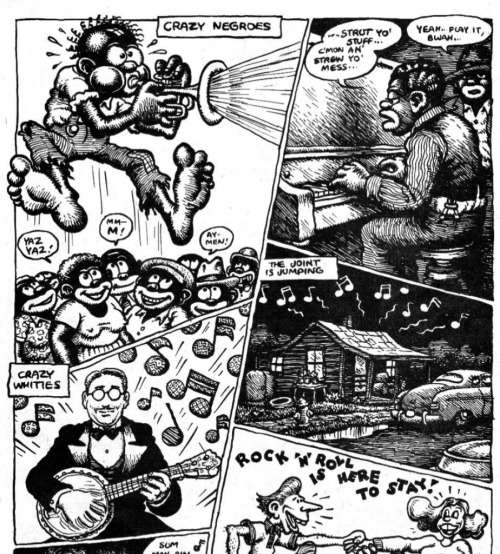In de jongste editie van Stripgids Magazine, nummer 15 alweer, lees je een boeiend interview met een van de bekendste Amerikaanse underground auteurs, Robert Crumb. Hier serveren we je het oorspronkelijke interview, in het Engels dus. Over waarom hij door sommigen gecanceld wordt, en wat er met ironie aan de hand is. Happy reading! De journalist van dienst is ‘stripprofessor’ Joost Pollmann.
“You know, you can’t go around presuming everyone’s going to get your little ironies”
“He pushes all limits in order to bring every guilty impulse or thought pattern to light, where it can be examined in all its ridiculous, risible nakedness.” Critic Robert Storr wrote this in the foreword of the anthology ‘Crumb’s World’ (David Zwirner Books, 2021). Robert Crumb himself explicited, on the cover of one of his other books: “I’m not here to be polite.” The 80 year old cartoonist, living in France, has been under fire for some time by supporters of cancel culture, who do not appreciate the irony and satire in Crumb’s oeuvre and accuse him of both racism and sexism. His satirical stories about blacks and Jews, in which he mocked several prejudices, are particularly notorious. That these stories were in fact intended as a form of social criticism is no longer appreciated or understood. In the interview below, Robert Crumb responds to the cancelling he is exposed to: “Most people don’t like satire. They even feel a little threatened by it.”
The problems began – if I’m correct – after the publication of your stories ‘When the Niggers Take Over America’ and ‘When the Goddamn Jews Take Over America.’ In the San Francisco Examiner of 28 September 1994, almost thirty years ago, David Armstrong wrote about these stories critically. Later on, the two stories were reprinted in the neo-fascist magazine ‘Race & Reality.’
R.C.: “THE PROBLEMS” began long before that. I drew “When the Niggers Take Over America” in 1992. I was already living in France by that time. I was being condemned for racism and misogyny and antisemitism and every damn thing already in the 1970s. That white supremacy magazine ran the two stories soon after they were published. They said, “Yeah, look, Crumb’s on our side!” They didn’t get it, but then neither did the left-liberals. And you may rest assured that Art Spiegelman (creator of “Maus” – a masterpiece of comic art) gave me a sound drubbing for those two stories. Actually, I did hear from a few black people who got the intent, though, you know, I understand that black folks don’t want to hear that shit from no whitey. Well, too bad, I’m sorry. I had to get it out. I’m a white shmuck, I admit.”
‘Well, gee, I thought from your comics you’d be this really obnoxious asshole.’ I had to laugh. She didn’t get the comics at all, God love her. A nice lady though. I didn’t hold it against her.
What happened after this publication? ‘Woke’ did not exist, yet, so I wonder when your work was being re-evaluated and condemned (by some). And what does being cancelled look like in practice?
R.C.: In fact, NOTHING happened after those two stories came out. You gotta understand that my actual books, my comics, always had a rather small audience. They never sold in huge numbers despite my legendary status in some quarters. I was never “mainstream” and never aspired to be so. Being cancelled had little or no effect on the sales of my books, and, funny thing, the monetary value of my original art just keeps going up and up. It makes me dizzy to look at the prices my old works are getting. I don’t own any of it myself, so, you know, mostly it’s other people who are getting the money. I don’t care. I’m doing just fine, financially. Which is kind of a miracle since I never ASPIRED to make money beyond basic subsistence. My core audience is about the same as it’s always been since the beginning. It’s probably shrunk a bit just from how old I am, and I don’t crank out those comics like I used to, and fewer young people are exposed to my stuff. You know, I’ve been doing this shit for 55 years already! Time marches on. I have no idea what the young folks are up to these days. They spend their time staring at little handheld screens. Weird.”
You have been living in France for quite some time now. Were you relieved that the hardcore woke movement is concentrated in the U.S.?
R.C.: “This whole ‘woke’ thing and ‘cancel culture’ didn’t just suddenly appear out of nowhere. Political correctness on the left had been around since the ‘70s, at least. Maybe even earlier. There have always been the thin-skinned people who were easily offended and for whom censoring others is their idea of fun. ‘Twas ever thus. They can be a real pain in the ass if they get their hands on “the levers of power,” but then there’s the corporate propaganda machine, which can use political correctness as a way of cloaking big business in a sheepskin of virtue. That kind of smarmy hypocrisy is much more nauseating than the merely irritating and vexatious ‘woke’ culture. And once the censorship starts, it’s hard to stop it and we all end up being afraid to utter a peep about anything except maybe the weather. Oops, better watch what you say about climate change! I’ve kinda stopped worrying about the wokies, but I suppose it could still get worse to the point where I become an UNTOUCHABLE, and nobody will buy my work anymore for fear of looking bad. Could happen, I guess. Jeez, I’ll have to sell my 78 records in order to pay the bills! A horrible thought!”
Did the cancelling affect you artistically? Is it still possible to make erotic work, for example? I understand that your Bible of Filth could only be printed in the Netherlands.
R.C.: “Another irony: Now that I’m old and my sexual energy has greatly diminished and I no longer have this overweening compulsion to put my sexual obsessions on paper and foist them on the public, there’s a demand for this sort of work among the COLLECTORS of my original art! They want perverted sex drawings! The more twisted, the better! Strange, right? I don’t get it. I never did get it. I just drew directly what was churning around in my guts. I had no marketing strategy, no target audience. Sometimes I make erotic drawings for special clients. Sick fuckers. Did the cancelling affect me artistically? I don’t think so. It was never big or powerful enough of a movement to make it impossible to find publishers and distributors.”

How are things now? Is your work still being published and exhibited in the U.S? Are there other countries where your work isn’t welcome anymore?
R.C.: “Yeah, my work is still published and exhibited in the U.S.A., no problem. A couple of years ago I had a big exhibit at the Zwirner Gallery in New York. This is a big gallery with a huge staff, comprised almost entirely of young people, 20-and-30 somethings, “art tots” with good educations, from affluent backgrounds. The day before the opening, the art critic Robert Storr gave a speech to the whole staff of the gallery about my work. He EXPLAINED it to them in a very articulate, eloquent, very educated way that these refined pups could understand. It was beautiful. I couldn’t have given such a speech. I can’t defend my own work. Robert Storr is my pal for LIFE after that! I wish I had a recording of that speech. As for ‘other countries’, some of them are more relaxed than the United States, almost anything goes. It’s surprising sometimes. In others, the interest in my work is so minor that it’s below the radar of the watchdogs of political correctness.”
In the Sixties you were one of the heroes of counterculture; decades later you were the scapegoat of cancel culture. What has happened in between? Satire is no longer understood, you said, and irony seems to have disappeared as a rhetorical instrument. What does this mean, culturally?
R.C.: “I never said ‘satire is no longer understood.’ What I might have said is, what I believe is, that satire is not amusing to most people. They may even feel a little THREATENED by it. Irony used to get me in trouble when I was a teenager. It only made them angry and want to punch me out, or in the case of girls, it just made them look down and frown, or they’d say, ‘What’s THAT supposed to mean?’ I had to stop doing it. I learned to shut up and stick to my pens and paper. Satire has never been widely appreciated. Ridiculing or making jokes about people is not the same as satire, which is more subtle than that. Well, you know, if you have to EXPLAIN it just, you know, let it go. Never mind. I’m not sure it’s ever been any different. I think it’s always been the case that satire and irony have been a way for artists, writers, cartoonists, to express a social critique that might be difficult or impossible to articulate in any other way, or that might be DANGEROUS to come out and say directly. Sometimes it’s just a kind of self-mockery, but even this can backfire on you and be taken wrongly. You exaggerate your own foibles to get a laugh but some a’ them are gonna take it at face value. Oops. Now they think you’re some kinda monster.”
“A woman I met years ago, after a conversation with me over lunch, said to me, ‘You know, you’re actually a pretty nice guy.’ ‘What do you mean?’ I asked her, ‘What were you expecting?’ ‘Well, gee, I thought from your comics you’d be this really obnoxious asshole.’ I had to laugh. She didn’t get the comics at all, God love her. A nice lady though. I didn’t hold it against her. You know, you can’t go around presuming everyone’s going to get your little ironies. You gotta be grateful if some of them get it. They are the ones who save you from going completely insane, or putting a gun to your temple.


